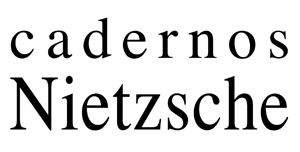Resumos
O objetivo do texto é analisar o que denominamos projeto crítico de superação da compreensibilidade, a partir de três hipóteses: a) a temporalização do pensamento, remontando-o às condições individuais do emprego de um conceito, um signo, uma ação, etc.; b) essa individualidade do pensamento implica em compreendê-lo de modo fluido, de modo que tão logo se alterem as condições individuais do emprego de um conceito, altera-se também seu sentido; c) Nietzsche não parte mais da vontade incondicional de ser compreendido e, sobretudo, universal e univocamente compreendido, mas sim da hipótese de que "não se quer apenas ser compreendido quando se escreve, mas sim e de certa forma também não ser compreendido".
compreensibilidade; individualização; fluidez de sentido; incompreensibilidade
This paper aims to analyze what we call as the critical project of overcoming the understandability based on three hypotheses: a) the temporalization of thought, taking it back to the individual conditions of use of a concept, a sign, an action, etc.; b) this individuality of thought implies in understanding it in a fluid way, such that as soon as the individual conditions of use of a concept are altered, so is its meaning, c) Nietzsche no longer departs from the unconditional desire of being understood and, above all, universally and unequivocally understood, but rather from the hypothesis that "one does not only wish to be understood when writing, but in fact and in a certain way one may also wish not be understood".
understandability; individualization; fluidity of meaning; incomprehensibility
- ALMEIDA, R. Nietzsche e o paradoxo São Paulo: Loyola, 2005.
- AZEREDO, V. Nietzsche e a interpretação: do mundo ao texto In: BARRENECHEA, M.; FEITOSA, C.; PINHEIRO, P.; SUAREZ, R. (Orgs.). Nietzsche e as ciências 1a. ed. Rio de Janeiro: 7 Letras, 2011, p. 202-213.
- BABICH, B. On Nietzsche's concinnity: an analysis of style In: Nietzsche-Studien 19 (1990) p. 59-80.
- CONWAY, D. Nietzsche's On the Genealogy of Morals: a Reader's Guide London, UK / New York, USA: Continuum, 2008.
- DIXSAUT, M. Nietzsche: Par-delà les antinomies. Chatou: Les Éditions de la Transparence, 2006.
- KANT, I. "Von einem neuerdings erhobenen vornehmen Ton in der Philosophie". In: Werkausgabe in zwölf Bänden Bd.6. Hrsg. von Wilhelm Weischedel. Frankfurt am Main: Suhrkamp, 1996.
- KNEBEL, S. Historisches Wörterbuch der Philosophie Bd. 9. Basel/Stuttgart: Schwabe & Co. Verlag, 1972.
- NIETZSCHE, F. Sämtliche Werke. Kritische Studienausgabe in 15 Bänden (KSA) Hrsg. Giorgio Colli und Mazzino Montinari. Berlin/New York: DTV & Walter de Gruyter, 1980.
- SIMON, J. Der gewollte Schein: Zu Nietzsches Begriff der Interpretation In: DJURIû, M u. SIMON, J. Kunst und Wissenschaft bei Nietzsche p. 62-74.
- STEGMAIER, W., Philosophie der Fluktuanz: Dilthey und Nietzsche Göttingen: Vandenhoeck & Ruprecht, 1992.
- ______. Nietzsches Kritik der Vernunft seines Lebens: Zur Deutung von „Der Antichrist" und „Ecce Homo". In: Nietzsche-Studien 21 (1992), p. 163-183.
- ______. Nietzsches "Genealogie der Moral". Darmstadt: Wissenschaftliche Buchgesellschaft, 1994.
- ______. Philosophieren als Vermeiden einer Lehre: Inter-individuelle Orientierung bei Sokrates und Platon, Nietzsche und Derrida In: SIMON, Josef (Hrsg.), Distanz im Verstehen: Zeichen und Interpretation II Frankfurt am Mai, 1995.
- ______. Nietzsches Zeichen In: Nietzsche-Studien 29 (2000), p. 41-69.
- ______. Anti-Lehren: Szene und Lehre in Nietzsches Also Sprach Zarathustra In: GERHARDT, V. (Hg.), Klassiker auslegen: Friedrich Nietzsche: Also Sprach Zarathustra, Berlin: Akademie Verlag, 2000.
- ______. "Philosophischer Idealismus" und die „Musik des Lebens: zu Nietzsches Umgang mit Paradoxien In: Nietzsche-Studien 33 (2004), p. 90-128.
- ______. Zur Frage der Verständlichkeit: Nietzsches Beitrag zum interkulturellen Kommunizieren und Philosophieren. In: Allgemeine Zeitschrift für Philosophie 32.2 (2007) p 107-119.
- ______. Philosophie der Orientierung Berlin/New York: Walter de Gruyter, 2008.
- TONGEREN, Paul v. Die Moral von Nietzsches Moralkritk Bonn: Bouvier Verlag, 1989.
- WITTGENSTEIN, L. Philosophische Untersuchungen Frankfurt am Main: Suhrkamp Verlag, 2003.
- WOTLING, P. Nietzsche et le problème de la civilasation Paris: PUF, 1995.
Datas de Publicação
-
Publicação nesta coleção
19 Jun 2015 -
Data do Fascículo
2013
Histórico
-
Recebido
11 Set 2012 -
Aceito
08 Set 2012

